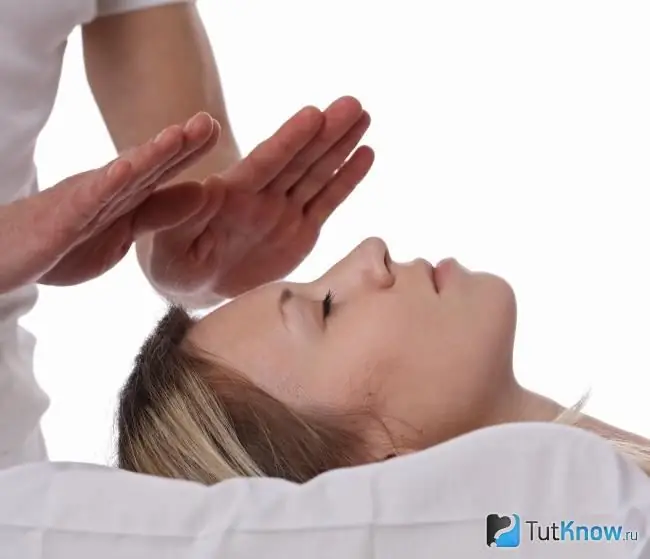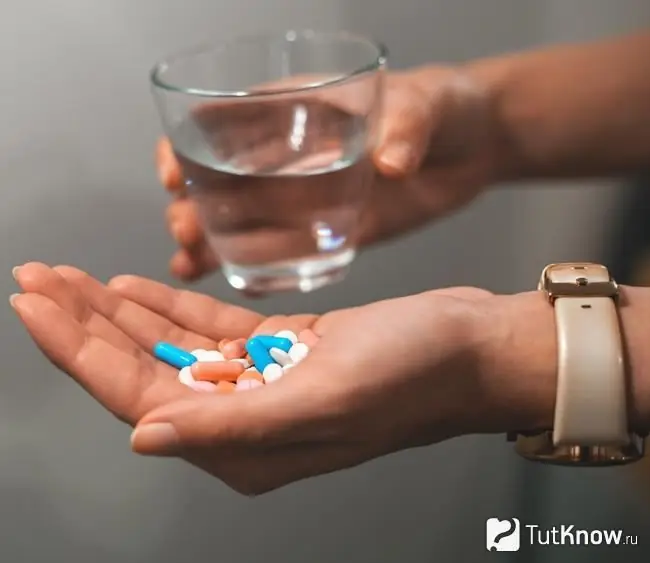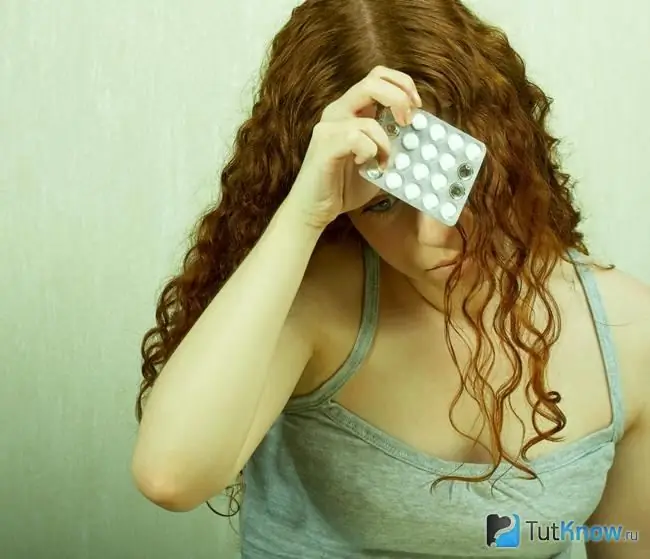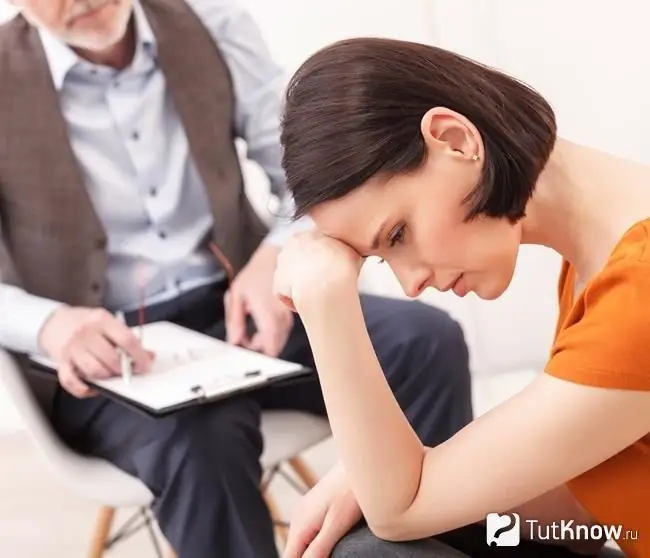- Author Arianna Cook [email protected].
- Public 2023-12-17 14:23.
- Last modified 2025-01-23 09:40.
What is pharmacophobia and why some people are so afraid of drugs. How the fear of taking medications manifests itself and what it can lead to. How to get rid of pharmacophobia. Pharmacophobia is a condition in which a person experiences a fear of drugs. At the same time, a pharmacophobe may not at all perceive treatment in any of its forms, but can only recognize traditional medicine. In any case, he endangers his life, since there are conditions in which it is impossible to do without the administration of drugs.
The causes of pharmacophobia
Modern pharmaceuticals are able to eliminate most of the "breakdowns" of the human body in any possible way: using tablets, capsules, pills, suppositories, ointments, injections, inhalations, etc. She has saved millions of lives and will save no less. Almost everyone today has their own medication experience and their most effective medication list. But there is a category of people who categorically refuse to recognize the effectiveness of pharmacological drugs. And there may be several reasons for such categoricalness.
Upbringing conditions

An unformed child's psyche, according to psychologists, is in many ways similar to a sponge. It absorbs everything that surrounds the little man - emotions, events, opinions, behavioral reactions. That is why the roots of many fears and complexes must be sought in childhood.
And here parents can play an important role - their way of life, principles of upbringing and outlook in general. These factors sometimes so firmly form the consciousness and life norms of a child that, having become an adult, he cannot and does not want to live differently. Thus, we inherit many anxieties and fears. And pharmacophobia is no exception.
If parents are unequivocally negative about medicines of synthetic origin, they use exclusively alternative methods for the treatment and prevention of diseases (traditional medicine, healing, etc.), it is not surprising that the child will also be wary of medicines.
Parents are a role model. And if they are sure that pharmaceuticals are only harmful, the baby perceives this as the truth and carries it with him into adulthood.
Own negative experience

The reason for the fear of taking medications can be a situation when the pills taken (injection, inhalation, applied ointment) led to the opposite effect. That is, they further worsened the condition or provoked the emergence of additional health problems. In this case, sensitive people can become so obsessed with this fact that they begin to project the situation onto all medications, without exception.
At the same time, emotions prevent them from realistically assessing the case of unsuccessful medication, that is, taking into account all possible factors of its occurrence. For example, self-medication, incorrect dosage or violation of the rules for taking the drug, side effects or compatibility with other drugs. The main thing that they take out of what happened is that pharmaceuticals only harm the body.
Character traits

Excessive sensitivity, suspiciousness, labile psyche are personality traits that are fertile ground for the emergence and development of phobias, including pharmacophobia. Sometimes the information heard or taken away is enough for such a person to form his life position. Therefore, heard from friends, seen on TV or read on the Internet, a "scary" story about an unsuccessful treatment can firmly sit in his mind and make him a convinced pharmacophobe.
Today, the media is overwhelmed with content about counterfeits, low-quality medicines, inappropriate prescriptions and side effects of drugs. There are also many people in the street who like to tell a similar "horror story" about themselves or other people (even not always personally acquaintances) who have suffered from pharmaceutical products.
Such information easily penetrates into the depths of the psyche of a susceptible person and settles in it as a grain of fear. And in order to avoid such an unpleasant situation, he begins to avoid any contact with medications.
One of the subtypes of pharmacophobia is neopharmacophobia, that is, the fear of taking new drugs. This fear may also be based on one's own bad experience of treatment with another drug or information about such experience received from the outside (from the media, from other people).
In this case, a person does not refuse to take medications in general - he is limited to drugs that are familiar to him, that is, drugs that have already been personally tested. And he does not accept any new, unfamiliar drugs. Even as directed by a doctor. Most often, susceptible people become neopharmacophobes, who, due to health conditions, are often forced to take medications.
Important! Finding the cause of pharmacophobia is a prerequisite for the successful treatment of this condition. To remove this "weed" from a person's head, you need to find its roots.
Manifestations of pharmacophobia in humans

The fear of taking medications makes the life of a pharmacophobe much more difficult. The panic fear that the medicine will harm makes its owner endure pain, fever, cramps and other unpleasant symptoms that accompany many diseases and injuries. Including life-threatening.
He does not accept the help of official medicine, since it uses medicines "dangerous" for him in its arsenal. Therefore, the pharmacophobe will not call an ambulance, will not go to the doctor, but will hope that everything will go away - the pain will subside, the temperature will subside, the pressure will return to normal, the injury will heal, etc. It is these people who become adherents of non-traditional methods of treatment and give themselves into the hands of healers, magicians and psychics. Or they rely on the strength of their body or recipes of traditional medicine.
Sometimes pharmacophobia can manifest itself in part - only to new drugs (already mentioned above neopharmacophobia) or to a certain dosage form. So, there are people who are panicky afraid of injections and droppers or cannot bring themselves to drink pills (capsules).
Regardless of the extent to which a person suffers from a fear of drugs, the main manifestation of his fear is panic. It occurs whenever a pharmacophobe is faced with the need to take medications (any or certain of their forms). And if his phobia still fits into the scale of a mild form, his panic mood may be limited to a feeling of anxiety and the search for an alternative solution to the problem.
In this case, the person can still be persuaded or offered a replacement. For example, if he is afraid of injections, choose a tablet form of the same drug or its analogue. If he is confused by the side effects, choose another drug with a similar effect, but less pronounced possible consequences of taking.
It is much more difficult for people who are firmly stuck in the quagmire of their fear - for them, this situation can provoke the occurrence of a panic attack. The mere thought of taking medicine or going to the pharmacy makes them feel very reluctant.
It manifests itself both in behavioral reactions, when the pharmacophobe tries in every possible way to avoid taking the drug (from ordinary excuses to physical actions), and in a change in the physiological state. He may have an increased heart rate, rise in pressure, dizziness, tremors and numbness in the limbs, itching, increased sweating, pain in the heart, a feeling of lack of air.
In especially difficult cases, everything can even end in fainting. It so happens that fear takes over the consciousness of its owner so much that at the moment of panic, the latter simply loses control over himself and his emotions. Protecting himself from an imaginary threat, that is, medications, a pharmacophobe in a panic state is capable of completely inappropriate actions. He may run away from home or a doctor's office, respond with aggression to attempts to persuade him to take medication, or physically resist with medical attention.
This fear is irrational, that is, it has no logical explanation. Therefore, if you ask a pharmacophobe why he is so afraid to take medications, you can hear absolutely absurd and unconvincing answers. Most often, such people appeal to the fact that most modern drugs are of a chemical, synthetic nature, which means that a priori they cannot be useful for our body.
Thus, pharmacophobia makes a person change and limit his life in many ways. Some do not change their lifestyle, but completely exclude official medicine from their lives, preferring alternative methods of treatment. Others focus on disease prevention to avoid having to take medication at all.
But neither one nor the other does not take into account such force majeure circumstances as injuries and conditions that require intensive drug treatment or surgery. And this is the main danger of pharmacophobia - the fear of taking medications poses a direct threat to human health.
The modern world is full of dangers, and the list of diseases is constantly updated with new nosologies. And not all pathological conditions can be cured with the help of traditional medicine and healing. The latter is especially dangerous, since not all people who offer such services have the ability to really help people. Therefore, often pharmacophobes, refusing the help of official medicine, only worsen their condition: acute diseases turn into a chronic stage, chronic ones "overgrow" with complications or pass into a severe stage.
This attitude is especially dangerous in the case of oncopathology, when delay reduces the chances of a positive outcome of the disease. No less problems can be caused by hypertension, bronchial asthma, allergic conditions and coronary heart disease, which are not corrected with medication in time.
During the study of pharmacophobia, it was found that this fear does not have a gender component, that is, it can settle in both a man's and a woman's head. The latter is even more unsafe, since it is the woman who becomes the mother, who by nature is responsible for her offspring.
Therefore, suffering from this condition, she puts at risk not only her health, but also the health of her child (children). This can be both at the stage of bearing a baby and in the process of his life. Fear of taking medications can provoke her to refuse medications while waiting for the birth of a child and not use them to treat an already born baby.
At the same time, sometimes it is precisely the correctly selected drug therapy during pregnancy and in the first years of a little man's life that predetermines his entire future life. That is why the treatment of pharmacophobia in young women is becoming very relevant.
Important! Scientists have long proven that obsessive fears negatively affect not only the quality of life, but also the state of human health. The periodic shocks that accompany contact with your fear literally exhaust the nervous and autonomic systems of the body. This leads to nervous breakdowns and disorders, somatic diseases.
Ways to Deal with Your Fear of Drugs

As already mentioned, in the modern world it is impossible to completely do without the products of pharmacology. Moreover, such a position in life carries many dangers and significantly worsens the quality of human life. Therefore, it is subject to mandatory correction.
Since the fear of taking medications is an irrational fear, the person affected by it often does not realize their problem, does not accept it, and cannot cope with it on their own. Therefore, only a specialist can help him and find the most effective way to get rid of pharmacophobia in his case.
The task of the psychotherapist in this case is to lead the patient to recognize his fear, accept it and learn to control it. The most effective in relation to pharmacophobia today are considered such psychotherapeutic practices as systematic desensitization, various relaxation techniques, cognitive-behavioral therapy. In especially difficult cases, hypnotic methods of treatment are used.
Sometimes, in mild cases, you can try to cope with your phobia before medication on your own. For example:
- If a wave of fear in your soul is raised by injections or pills (capsules), ask your doctor or pharmacist at the pharmacy to find an acceptable form of the necessary drug for you.
- If you are desperately afraid of anesthesia, but the situation develops in such a way that it is impossible to avoid it (upcoming surgery) or not desirable (treatment or tooth extraction), try to realistically assess the consequences of your fear. First, the purpose of anesthesia is to relieve a person of pain. By rejecting it, you doom yourself to pain, and by rejecting surgery or dental treatment - to complications and even death. Imagine the consequences in paints. If such arguments did not have the desired effect and did not relieve you of fear, create yourself "insurance". Find out which drug or type of anesthesia will be used with you and, if possible, study all the nuances of its use. And at the same time information about the doctor who will do it, as well as the medical institution and its capabilities (material and technical base, the availability of qualified personnel). Talk to the doctor, enlist his support in any way convenient for you. Take the time (if you still have it) and find the safest place for the unpleasant procedure from your point of view, minimizing all possible risks. Thus, you will rob your fear of "food".
- To reduce your fear of drugs, you can also try to start dealing with it with the least “dangerous” drugs. For example, vitamins. And then move on to symptomatic medications - pain relievers, antispasmodics, antipyretics, etc.
At the same time, remember that the above methods of self-medication are effective not only under the condition of a mild degree of pharmacophobia. The first prerequisite for their effectiveness is the realization that you have this fear. Otherwise, all efforts may not just be in vain, but even further increase the phobia.
How to get rid of pharmacophobia - watch the video:

Pharmacophobia is a condition that, like most fears, is based on the instinct for self-preservation. But at the same time it brings more inconveniences and risks to health and life in general than benefits. Therefore, this phobia is subject to mandatory correction, which can only be provided by a qualified psychotherapeutic specialist.






